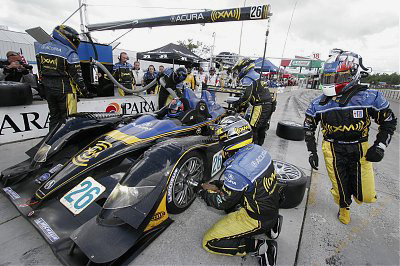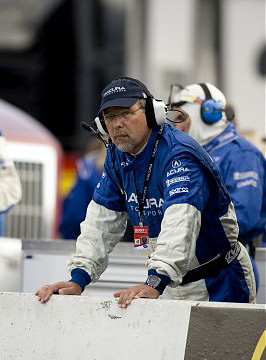They Way It Is/ Assessing Acura's rookie season in the American Le Mans Series
by Gordon Kirby After scoring an amazing debut class victory in this year's ALMS season-opening Sebring 12 Hours, Acura and Honda Performance Development have been brought back to earth. Over most of the rest of the season, Acura's three teams have encountered inevitable development problems and struggled to match the pace of the well-developed Penske Porsches which have seriously hit their stride in their second season, scoring the team's seventh win at Mosport last weekend.
After scoring an amazing debut class victory in this year's ALMS season-opening Sebring 12 Hours, Acura and Honda Performance Development have been brought back to earth. Over most of the rest of the season, Acura's three teams have encountered inevitable development problems and struggled to match the pace of the well-developed Penske Porsches which have seriously hit their stride in their second season, scoring the team's seventh win at Mosport last weekend.
Acura won the LMP2 class and finished second overall at Sebring in March with Bryan Herta, Dario Franchitti and Tony Kanaan driving Andretti-Green's Courage-based Acura ARX-01a. The Penske Porsches encountered alternator problems at Sebring but since that heady debut the three Acura teams have been overshadowed by the Penske Porsches in particular, and also by the factory Audis which continue to run solid, consistent races.
Post-Sebring, the Acura teams have been able to achieve only five podium finishes with Andretti-Green's ARX-01a taking second overall and in class at Houston, the Lowe's Fernandez Lola-based car finishing a dogged third at Mid-Ohio and the Highcroft ARX-01a taking a trio of thirds at St. Petersburg, Lime Rock and Elkhart Lake,
"I'm not disappointed with our results this season," commented HPD boss Robert Clarke. "We started out with a win at our first race in arguably the most difficult race within the series, which was well beyond our expectations. I think the way we started the program with the unique set-up we have with three teams, each with one car that has a purpose in the development program, I would say that strategy worked very well and the fact that we got the results we got at Sebring was an indicator that it did work. Obviously, it prepared us for that event.
"Now, with some hindsight," Clarke continued. "I think that once we got ourselves up and running and ready to compete in the series and once we got into the regular season, probably the strategy should have been adjusted in order to deliver the best results. So I think you will see the program evolve between now and the beginning of next season to generate better on-track results."
I asked Clarke if he could be more specific about how Acura will change the way the program works to develop the cars between the three teams and make the required improvements in performance. "I would simply say it's about better team work and working together," he stressed.

© LAT USA
Clarke acknowledged that Porsche has established a new standard for LMP2 cars which will be difficult to match. "Porsche is a bit of a moving target," he observed. "We know they have made gains throughout the season and I would say we're staying on track with that. But we're a notch below and if we're moving in parallel with them and doing the same things we're doing, we'll never catch them. So we need to to do something different. We need to think smarter and we need to make a step in our program that will get us up hopefully beyond that level.
"So that's the challenge going into next season because next season is about on-track results. It will be time to start winning on more of a regular basis."
Last winter and spring HPD took a serious look at designing and building its own car but a decision has been made not to go down that road. "As you know, we looked at designing and producing our own tub," Clarke said. "But after assessing the difficulty and the costs and the distraction it might be in taking away resources we determined that those resources could be best used in other ways."
The Acura development program will continue to be based on the Courage chassis raced by Andretti-Green. "We ultimately have decided that we'll stick with what we have--the Courage," Clarke confirmed. "We think we can get better value out of focusing on other areas of the car. You'll see the rest of the car evolve to the next step. Next year's car will be called the ARX-01b and will be the next evolution of our car.
"We did ninety percent of the work in three and a half months time to change the car from the Courage that it was to the ARX that it is today, and I'm very proud of what we've achieved. After all, we won our first race with this car."

© LAT USA
He says improving the serviceability and repair capabilities of the cars is one of the Acura teams' primary problems. "One of the biggest issues we've had with the car is the serviceability, or being able to repair the car in the case of an accident or a failure during a race," Clarke commented. "Audi is clearly the top in that category. Porsche is a notch below, but not a big notch, and our cars are way down the list, as evidenced by St. Petersburg where it took us thirty minutes to replace a wing strut. That was totally unacceptable so there's been a lot of focus on addressing those things in this next 01b evolution. We need to be able to repair large sections of the car very quickly."
The Automobile Club de l'Ouest, organizers of the Le Mans 24 hour race, have proposed a move in 2009 from open cockpit to closed cars with a larger, spec car-like nose and greenhouse. This was not the route Clarke and Acura envisaged when the ALMS program was formulated and at this stage Acura is lobbying for the ACO to change its plans. Of course, the ACO is a notoriously prickly organization which is insistent on doing things its own way, so it will be interesting to see how the ACO's vision of the future affects Acura's longterm plans for racing at Le Mans.
"As I've been on record saying, it's caused us to revisit our original plans," Clarke commented. "At the moment, we have not changed those plans. We're still working towards a move to P1 as originally planned. We're still trying to understand the LMPE category the ACO are proposing. Of course, the rules aren't even out yet and we'll have to wait and see what those are."
Honda/Acura has been engaged in initial briefings with the ACO and Clarke says he and his company are happy with the process so far. "I can't argue with the logic that they've applied to this, but I have to see the rules to be sure that we're in alignment with them. I understand where they're coming from and I'm sure it makes sense to them. I'm not arguing that.
"Maybe Honda tends to be more of a purist," Clarke added. "We ask, why would you want to do that to a premier level race car when it's a compromise in its performance? You have to put your marketing hat on and think of it from that viewpoint. After all, racing is a business. We might like to ignore those things, but you can't."
Clarke says the reaction to the ALMS program within Acura and HPD could not have been better, adding that it's all about competing against other factories. "The program has been very exciting and has generated great morale within HPD because of the opportunity to actually have competition and to have that challenge that we didn't have before," Clarke said.
"We're thrilled with the program and we're very happy with ALMS. Everything that we saw and set out in the program as opportunities for bringing Acura into sports car racing and the positioning of Acura within the sport with its international appeal and technological appeal has delivered exactly what we expected. So we're pleased with that."
Yasuhiro Wada is general manager of Honda's Motorsports Division. Mr. Wada has been with Honda for thirty-three years and served as president of HPD in California from 2003 through March of '05.
"I am happy to see the whole purpose of our participation in the American Le Mans Series is working as a stand-alone entity," commented Mr. Wada. "When it was clear there would be no competition at Indy and in the IRL we made a decision to come into the ALMS where we could compete against other manufacturers. I think we made a good decision to come into this series. We are enjoying the challenge and look forward to keep moving on through the field of development."
Acura's multi-car effort is aimed at trying to catch and do battle with the Penske Porsches and this contest will be a feature of the ALMS over the next few years. With Audi continuing in the thick of it with the company's R10 LMP1 turbo diesels and Mazda also fielding an LMP2 car, the ALMS is enjoying a titanic battle among a brace of manufacturers and factory-backed teams.
The question for the ALMS is how far forward can this phenomenom carry the series? The ALMS attracts nice crowds for many of its races and has a much bigger fan following than the rival Grand-Am series. Its TV ratings have also improved, but the ALMS continues to lack any serious media footprint in the United States, pulling even less newspaper coverage than the IRL or Champ Car! And without any star or name drivers and the focus of the ALMS centered on the cars and the teams, that situation isn't going to change.
It will also be interesting to see how the ACO's Le Mans rules pan out over the next few years and whether or not the Penske and other Porsche Spyder teams and Acura's fleet of ARX-01bs ultimately race at Le Mans.
Meanwhile, Acura is delighted to have found a place to compete against other manufacturers for technological and bragging rights. That, after all, is why manufacturers go racing.
Auto Racing ~ Gordon Kirby
Copyright 2007 ~ All Rights Reserved
Copyright 2007 ~ All Rights Reserved
Top of Page